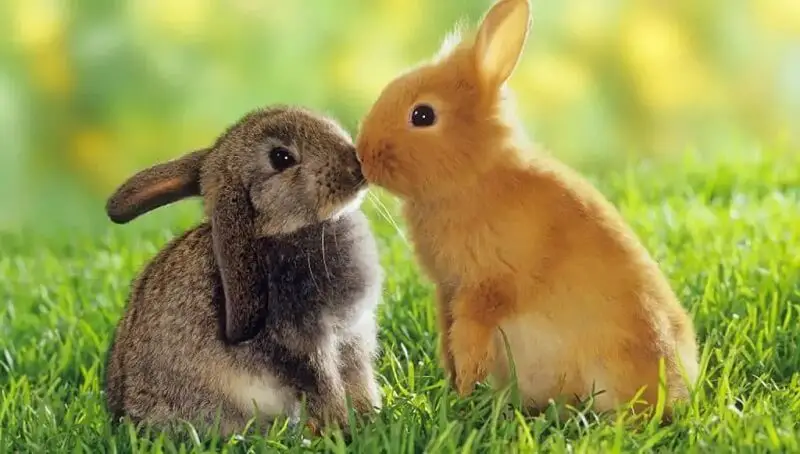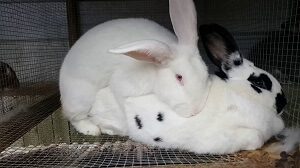
Do Poodles Bark?
April 15, 2022
How Do You Clean Rabbit Poop Off Grass?
April 15, 2022
Although most of the time rabbits are not monogamous and monogamy will be pushed on them by the situation at hand, rabbits do end up mating for life from time to time. When being part of a bigger group, rabbits tend to rank themselves based on the level of dominance, which will also determine their mating partners.
In the case of domestic rabbits, that are caged together or are made into a pair inside a household, they will usually end up mating with one another forever.
As long as they are healthy but in captivity, rabbits have no problems sticking to just one partner for all of their lives. While part of a bigger social group, they will usually get into fights when trying to rank themselves to be more desirable as mates.
Rabbits don’t have a lot of reasons to start a fight, especially in a smaller group. This means that they will usually fight either for mates, food, or their resting areas.
Males will usually do the fighting and will only find other males from the group to fight with. Most of the time the fight won’t get very intense, because their natural instincts will tell them to respect the younger and larger rabbit as the dominant one. This will, of course, depend on the group, the individual rabbits from that group, and their general will to fight.
You might also like my articles on rabbit mother sounds for her babies, cute bunny names, or the reasons behind rabbits having red eyes.
So will rabbits mate for life?
No, most of the time won’t and in a bigger social gathering, they will have no problem mating with the closest female they find. Continue reading this article to understand the reasons behind this mating behavior.
Reasons for Rabbits Not Mating For Life
1. Asserting Dominance
When taking into consideration a group of rabbits that are living within a set area, you should know that it will be natural for them to start looking for mates, which also means that they will start to fight to impress possible mates.
You will usually see this behavior in rabbits that are older than six months. They will use any chance to assert dominance over any other rabbits, in the hopes of landing the healthiest mates.
This won’t just happen in bigger groups. A small group with just a few rabbits will still have some of them fighting for dominance one over the other. When one of them becomes the dominant individual, it will try to mate with any females it gets close to, to assert dominance over all of the other males.
2. Spreading Genes
 This is a common reason why animals choose to mate for life. Rabbits have an instinct to mate with as many partners as possible, in the hopes of spreading their genes as much as possible.
This is a common reason why animals choose to mate for life. Rabbits have an instinct to mate with as many partners as possible, in the hopes of spreading their genes as much as possible.
This will be behind the mating drive that will push them continuously from one partner to another.
In the hopes of making as many healthy babies as possible, rabbits will not only be pushed towards any new mates they can find, but they won’t refuse a good time with their family members either.
As said above, you can expect your rabbit to reach its mating maturity at around 6 months old. From that point on, they will be able to mate at any point throughout the year and if they will have partners to do this with, they will surely do it.
3. Staying Active
This is one of the reasons why captive rabbits will mate from time to time and is more common for younger specimens.
Let’s face it: there’s not a lot to do in a cage so when you’re in your prime years and there with a cutie that has the same natural urges as yourself, well… things will heat up pretty fast. You will notice a male rabbit that wants to mate by its leapfrogging over the female.
Why would some rabbits leapfrog over other rabbits?
This is usually their way of showing that they are healthy enough for physical activity. Female rabbits can’t ask for medical tests from their possible mates, so a jump high in the air should be the perfect sign of health.
Conclusion
So do rabbits mate for life? They aren’t monogamous by nature and will only mate with just one partner when they can’t find any others around. As a general rule, when in a group, they will try to mate with as many partners as possible, although they will have to fight with other males for their place in the group.
